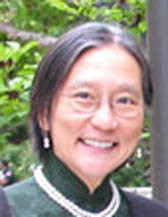
by Kathryn Stelljes
Inez Fung, one of the world's pioneering researchers on global climate change and the Earth's carbon cycle, has been selected as the recipient of the 2004 Roger Revelle Medal of the American Geophysical Union, the world's largest society of Earth scientists.
The prestigious Revelle Medal "recognizes outstanding accomplishments and contributions toward the understanding of the Earth's atmospheric processes, including its dynamics, chemistry, and radiation, or the role of atmopshere, atmosphere-ocean coupling or atmosphere-land coupling in
determining the climate, biogeochemical cycles, or other key elements of the integrated climate system."
The first recipient of the medal was E.N. Lorenz of MIT, who discovered chaos. Fung is the first woman and the second UC Berkeley researcher (after Professor Emeritus Harold Johnston of Chemistry) to have received the medal since its inception in 1991.
Fung is a professor in the College of Natural Resources' Department of Environmental Science, Policy and Management and the College of Letters and Science's Department of Earth and Planetary Science. She joined the UC Berkeley faculty in 1993 as the first Richard and Rhoda Goldman Distinguished Professor for the Physical Sciences and is the founding
director of the Berkeley Atmospheric Sciences Center.
In 1990, she deduced that the terrestrial biosphere has been absorbing a large fraction of the atmospheric carbon dioxide from fossil fuel combustion. Though controversial at the time, the terrestrial carbon sink has since been confirmed and has become a central negotiation theme in international protocols.
Fung is the acknowledged pioneer and principal architect of the field of Earth System Modeling, where the complex physical, biological and chemical reactions on Earth are distilled into mathematical equations to be solved on the fastest computers to predict the evolution of Earth's climate. Her current research is focused on whether global warming will be accelerated through destabilization of carbon storage in the biosphere.
Fung was one of the authors of the National Academy of Sciences' 2001 report "Climate Change Science", which led to President Bush's acknowledgement, in a Rose Garden speech on June 11 2001, that global climate change is a serious issue. As co-Chair of the Biogeochemistry Working Group of the Community Climate System Model of the National Center for Atmospheric Research, she is spearheading the US effort in the coupling of interactive terrestrial and ocean carbon biogeochemistry with mathematical models of the physical climate system.
In 2002, she became a charter member of the National Academies Coordinating Committee on Global Change, which will serve as an advisor to the Presidents of the National Academies on an issue deemed high priority by the National Academies.
She has been the recipient of numerous awards, starting with the 1977 Rossby Award for Outstanding Thesis from her MIT department, given for her doctoral research which drew the parallel between spiral galaxies and spiral rainbands in hurricanes to explain hurricane rain patterns. Her
other honors include the NASA Exceptional Scientific Achievement Medal, and elected Fellowship in the American Meteorological Society and the American Geophysical Union. In 2001, she was one of three women Berkeley faculty members (in a class of 72) elected to the prestigious National Academy of Sciences.
Fung will receive the Revelle Medal in December 2004 at the American Geophysical Union's annual meeting in San Francisco.
